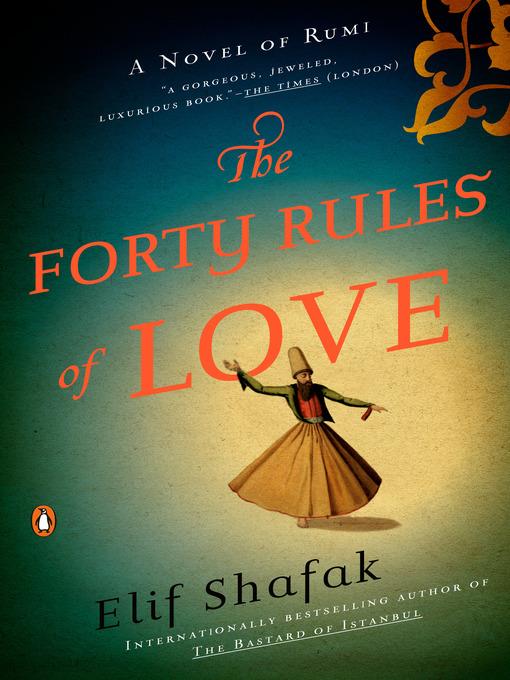
The Forty Rules of Love
A Novel of Rumi
کتاب های مرتبط
- اطلاعات
- نقد و بررسی
- دیدگاه کاربران
نقد و بررسی

November 30, 2009
Celebrated Turkish novelist Shafak (The Bastard of Istanbul
) serves up a curious blend of mediocre hen lit and epic historical to underwhelming results. In present-day Boston, dull suburban mother and cheated-on wife Ella Rubinstein takes a job as a reader for a literary agent and becomes entranced by Aziz Zahara, the author of a manuscript about the relationship between 13th-century poet Rumi and Sufi mystic Shams that, for better or for worse, becomes a story-within-a-story. Aziz and Ella strike up an e-mail relationship, largely made up of Ella's midlife crisis and Aziz's philosophical replies. Meanwhile, Aziz's novel, Sweet Blasphemy
, is occasionally interesting but mostly dull, weighed down by Rufi's and Shams's theological musings. Its better moments concern tangential characters; Rumi's son, Aladdin, who is resentful of his father's closeness to the mystic, and Rumi's adopted daughter, Kimya, whose doomed marriage to Shams is touching in a way Ella's failed relationship with her husband never manages. The rumblings against Shams reach a peak, and Ella and Aziz finally meet, tying the story lines together into a readable, if not enthralling, tale.

January 1, 2010
The bestselling, controversial Turkish author (Bastard of Istanbul, 2007, etc.) enfolds a historical narrative about a Sufi poet within the contemporary tale of a discontented Massachusetts housewife.
With her daughter in college and her twins in high school, Ella Rubinstein has gone back to work as a reader for a Boston literary agent. She accepts the lack of passion in her marriage to a philandering dentist—this unfortunate stereotype is typical of Shafak's tin ear where Americans are concerned—until her first reading assignment forces her to reexamine her complacency. It's a manuscript entitled Sweet Blasphemy, which describes the 13th-century friendship between Rumi, a respected Muslim scholar, and Shams, a wandering dervish who became his soul mate. Soon Ella is carrying on an e-mail correspondence of growing intensity with the manuscript's author, Craig, a Scot who found Sufism after a long period of personal crisis. Craig and Ella are soul mates too, and it doesn't hurt that he's cute. It's hard to care about Ella, who considers her younger daughter's eating disorder a distraction from her pursuit of spiritual enlightenment. The energy, complexity and empathy found in Shafak's previous work are evident only in the sections of the text devoted to Rumi. He suffers humiliations from Shams, a gifted mystic but far from perfect human being who cuts him off from his family and followers, but Rumi appreciates the deeper meaning behind the tests Shams sets for him. When Shams is murdered with the help of Rumi's jealous son, Rumi's grief blossoms into great poetry still beloved today. In the parallel present, Ella leaves her family to follow Craig to Turkey, knowing he has terminal cancer. His death only deepens her commitment to her personal quest, and she heads to Amsterdam, where he had lived. After all, the kids can always visit.
Shafak should have dropped Ella's story, with its preachy spiritual ruminations, and stuck to Rumi's odyssey, which opens a window into a world Westerners know little about.
(COPYRIGHT (2010) KIRKUS REVIEWS/NIELSEN BUSINESS MEDIA, INC. ALL RIGHTS RESERVED.)

January 15, 2010
Parallel spiritual experiences leap across hundreds of years in this story of searching and awakening by Turkish author Shafak ("The Bastard of Istanbul"). Nearing 40, Ella Rubenstein runs her American suburban household with grace, denying any evidence that all is not well (her husband is unfaithful, and her kids are distant). Once she gets a job assignment to read the manuscript of a novel involving Rumi, the poet and Sufi master, her well-ordered world is changed forever. She begins an email correspondence with Aziz, the charming and mystical author, that becomes the impetus for her own personal renaissance. Moving rapidly across continents and across time, Shafak's allegorical tale functions as a vehicle for the titular 40 rules, which are woven throughout. Chapters alternate between Ella's life in 2008 and the lives of Rumi and other characters from the manuscript, set around 1245. The tantalizing possibility of romance lingers, although with much vexation, as these Forty Rules of Love point not to "eros" but to "agape", the love of God and of all beings. VERDICT This novel, a best seller in Turkey, may appeal to fans of Nicholas Sparks or Robert James Waller. [See Prepub Alert, "LJ" 10/15/09.]Susanne Wells, P.L. of Cincinnati & Hamilton Cty.
Copyright 2010 Library Journal, LLC Used with permission.

Starred review from February 15, 2010
As in her previous book, The Bastard of Istanbul (2007), Shafak, a courageous, best-selling Turkish writer, boldly links East and West in converging narratives. In present-day Massachusetts, Ella, an unhappy housewife on the cusp of 40, begins reading manuscripts for a literary agency, and soon finds herself exchanging personal e-mails with Aziz Zahara, a wandering Sufi photographer and the author of Ellas first assignment, an enthralling novel titled Sweet Blasphemy. It fictionalizes the true story of the esteemed thirteenth-century Muslim teacher Rumi, who undergoes a profound transformation when the wandering dervish Shams of Tabriz, a renegade of strange and unnerving powers, comes to town. The two become inseparable, and as Shams shares the liberating forty rules of love, Rumi becomes a rebel mystic, the inventor of the ecstatic dance of the whirling dervishes, and a fervent and cherished poet. Under Azizs influence, Ella also breaks free of convention and opens herself to cosmic forces. Infused with Sufi mysticism and Rumis incomparable lyrics, and sweetly human in its embrace of our flaws and failings, Shafaks seductive, shrewd, and affecting novel brilliantly revives the revelations of Shams and Rumi, and daringly illuminates the differences between religion and spirituality, censure and compassion, fear and love of life in our own violent world.(Reprinted with permission of Booklist, copyright 2010, American Library Association.)

























دیدگاه کاربران